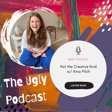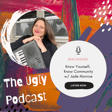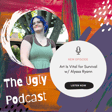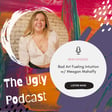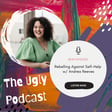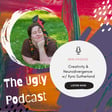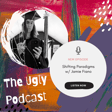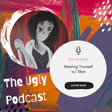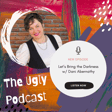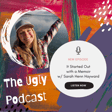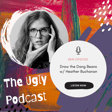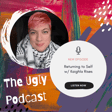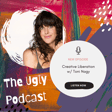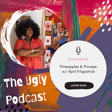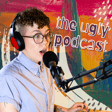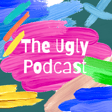Introduction to the Ugly Podcast
00:00:03
Speaker
Welcome to the Ugly Podcast. I'm your host, Lauren Alexander, she, they, and this is the place where creatives are encouraged to make messy, ugly art and let go of perfectionism.
00:00:14
Speaker
I started this podcast with my creative partner, Emerson, and we've since grown into our businesses. And this podcast is now evolving into a space where I interview other creatives to discuss our creative processes and how we navigate the mental mind field of creativity. This podcast serves as a reminder that you and your art get to be whatever the hell you want to be, ugly and all.
Meet Ani Kamoula: Author and Coach
00:00:41
Speaker
Hello, everybody. Welcome back to the Ugly podcast, where I try not to care what I'm doing and instead just create without thinking. I'm so excited about my guest today. My guest is an author, a developmental editor and a writing coach living in Bellingham, Washington. She has published works in the Narrative Projects True Stories volumes.
00:01:05
Speaker
True Stories Volumes 1-4 has written, produced, and performed one-woman dance and storytelling shows. This is My Body and Filling the Void has produced and performed a solo storytelling show. Stories of strong women from around the world and has worked with hundreds of writers in their writing journeys. Her memoir is forthcoming and the working title is Trading Stones for Feathers.
00:01:29
Speaker
For the last 15 years, I'm going to keep going because I really loved every, you were like, you can cut some of this. And I'm like, no, you are amazing. And I have to include almost all of this. I think I cut one sentence for the past 15 years. She has also developed her relationship with the creative process through a dance based meditation practice, finding commonalities between words and movement.
00:01:48
Speaker
She particularly loves dubstep and proves herself terribly awkward on a stand-up battle board, is a fan of high-quality chocolate, and will challenge anyone to a game of blockess. And I'm really excited to know what that is. Would you please share your name and your pronouns for everybody? Hi, Lauren. My name is Ani Kamoula. My full name is Analisa. I go by Ani. And my pronouns are she, hers.
00:02:12
Speaker
Thank you so much.
Exploring Creative Interests: Games and Music
00:02:13
Speaker
Okay, so what is Bloccus? I need to know first what this is. Best starting question ever. Bloccus is a really great game that's sort of like a board game version of Tetris.
00:02:28
Speaker
where it shapes that different it's like block us with multiple players and you're all trying to get your pieces on the board and But you end up having to like overlap and play strategically and like break people off from where they need to go but I think why I love it is that it's totally spatial and I
00:02:54
Speaker
it's just a way that my mind works. So it's really fun for me. Oh, cool. That does sound really fun. I also like those like puzzle games, like getting things to fit and then being strategic that way. I love that. Right. Yeah. Cool. It's sort of like editing with shapes. Instead of words, you know, you're putting shapes into spaces and places in order to, I don't know, meet your goal. Yeah, that is definitely like a similar part of the brain, I think. Yeah. Yeah.
00:03:25
Speaker
Um, I also did not peg you for a dubstep person. I love dubstep. That is, I, when I picture you listening to music, I think like maybe folk or
00:03:39
Speaker
like, like Bon Iver, like this ethereal, beautiful music. And then you come out with dubstep, I'm learning so much new things. Yeah, so many things about you. I mean, I'll never say no to Bon Iver, but I really love, like the satisfaction of the bass beat. Yeah. And like, when you you have the electronic and then it like, boom, it does those drops and just the surges of energy. Yeah, it's just really satisfying.
00:04:08
Speaker
Oh, I love that too, by the way. Yeah, yeah, yeah. Let's go dancing sometimes.
The Power of Creative Collaboration
00:04:13
Speaker
Sounds good. Yeah. Well, first, before I jump into what we're talking about, just some little background for people. Ani and I met through Emerson. And it was when I first started editing, Emerson was like, well, I know this amazing person who is also an editor, and she might be willing to talk to you. And you were. And Ani was my first editing mentor.
00:04:37
Speaker
Yeah. And yeah, you really helped me like gain some confidence in those early days and like, get my foot out. Yeah. Into the door, whichever. Whatever, whatever metaphor I was trying to go for that I'm not sure. No, it was really, it felt really easy and fun to work with you. And so great of Emerson to think of me. And it's great. Now we're, you know, collaborating on projects, you know, yeah, your client and it's super fun. So good.
00:05:07
Speaker
Yeah, it's really lovely to meet more people who geek out about words the same way that I do. So I appreciate, and you hold skills that I don't have in the editing world. Like you're way more specific. You know the rules. I don't know the rules. I sort of know the feelings. That's from all the perfectionism. I love rules. Yeah. So there's value in that for sure.
00:05:34
Speaker
Awesome. So today we're going to be chatting about the creative process. And so tell me about your relationship with creativity and your process. And I'm really excited to hear like what you were like as a kid, because you are, you just exude creativity and
00:05:52
Speaker
as somebody who is still very new in my relationship to creativity compared to like the greater span of my life, I'm just like in awe of you and how it just pours out of you so easily. So tell me about Baby Ani. Baby Ani. I've definitely been creative from the get-go. And I come from a really creative family, so that helps.
00:06:21
Speaker
start of course with my ancestors. My great grandfather was a fairly famous painter in Germany and Egypt and so I grew up with his paintings on our walls.
00:06:34
Speaker
Yeah, at my childhood home. And my older brother, Stefan, was really creative and doing a lot of drawings and playing trombone. Both my brothers were in band. My mom's a quilter. My dad was was creative, but he was very much focused on, you know,
00:06:52
Speaker
you know, having to earn money, you know, growing up, but now that he is retired, he's a full time potter. Oh, cool. And yeah, my dad's parents were weavers and entrepreneurs, and my mom's mom was a photographer, a teacher, but then also a photographer in her retirement. So there's lots of just lots of creative role models in my life. And you know, I was thinking about this too, in preparation for our talk,
00:07:22
Speaker
I went to a Montessori school as a kiddo. And in a Montessori classroom for the preschool kids, you get to choose what you do. And there's a whole process around choosing the work that you want to do, taking it off the shelf, doing the work.
00:07:45
Speaker
And then putting it back on the shelf, like there's, there's sort of a process ingrained in it. And then, you know, there were requirements, like we had to do like one math and one science and one, or yeah, one language and one creative arts, and then we could do whatever we wanted after that. And of course I did like one of everything else and then like five creative arts for the rest of my life. Like I was always, you know, the kid in the craft bin and, you know, making collages and writing short stories and things like that.
00:08:13
Speaker
So I was really, I think blessed to have it in my environment and available to me and fostered in a lot of ways.
Ani's Creative Process and Upbringing
00:08:25
Speaker
I think my creativity, well, I think it sort of begs the question of how do we define creativity? And for me, creativity in itself is just the raw energy that we have, just our primal energy that is who we are.
00:08:43
Speaker
And then a creative process is what we do with that energy. I like that distinction. Yeah. Yeah. And I think the difference between a creative energy and a creative process is taking
00:08:58
Speaker
the creative energy and giving it an intention so that you're blending the two and then there's a conversation that happens in the creative energy and the intention and sometimes it works and sometimes it doesn't and often it changes.
00:09:16
Speaker
So I say all that because as a kid, I had a huge temper. I was, I was really angry. Like, you know, my family was there. The adults around me were very busy. My brothers were a decade older than me. So it was like, everything was moving really fast. And I was just angry about that. And I wanted to be dreamy and take my time and.
00:09:35
Speaker
Um, I, you know, had opinions right out the door. Um, so I think, you know, having big emotions and, um, access to big emotions was a, you know, a sign of my big creativity. Um, you know, that I had access and I retained access to that energy and then found my way as I grew up.
00:10:02
Speaker
into reading one of my earliest memories is being in preschool and reading it was one particular book, Miss Rumpheus by Cooney, Barbara Cooney, maybe I don't remember her name, but it was one particular book that just like totally has infused itself into me. And then of course doing all those art projects I was talking about and then I got into theater and
00:10:26
Speaker
getting on stage and exploring my voice in different ways through the body and you know graphic design and drawing classes and writing classes and all of these were ways to stay witnessing myself and who I was and often a way to regulate my emotions that were pretty off the hook right so there's something about
00:10:53
Speaker
What do you do with that raw energy when it, like in some ways I had a lot of structure around it, right? Like there's a lot of opportunity, a lot of value in the arts, but also not a lot of structure in that the family unit that I came from didn't really know how to navigate emotions.
00:11:14
Speaker
That's, you know, common. And so I was lucky that, you know, the school districts offered opportunities and creativity, you know, and I ended up getting to be an artist. And I don't know, but there is a part of me that's like, it comes naturally, you know, I'm not a computer scientist for specific reasons.
00:11:36
Speaker
And I love story. My family are big storytellers. I get the five of us together at a dinner table and we just talk. We talk in stories to each other. And yeah, I went to college, thought I'd be an art major.
00:11:54
Speaker
ended up at Fairhaven College, which is an interdisciplinary college at Western, and discovering somatics, which is the awareness of the body, like the body's experience or the study of the body's experience from the inside, like direct, like gathering information from direct primary source of my own body. And
00:12:18
Speaker
learning how art and dance and meditation and all of these things helped to really regulate my emotions. And then I could understand the science behind my you know, like, this big question of like, why do I have such big emotions that I can't regulate, you know, I started to learn these really incredible tools, and then was able to start blending them together with the semantics and the dance and the music and then the writing and the storytelling and being on stage and
00:12:47
Speaker
the meaning making that comes with storytelling. And then just sort of found my, you know, did a whole bunch of cool stuff in my 20s and then ended up in a writing program and called the narrative project for my own book and then started working for it as well and working with other writers in their process and really focusing for the first time on how
00:13:15
Speaker
How do people relate to their processes through their bodies? We have our bodies here. They're with us all the time. A lot of people think their creativity comes from the head or is thought-based, but it's emotions-based. Let me tell you, it's emotions. Yeah, 100%. Emotions are sensations in our bodies. So if we can get physical with our emotions and move those emotions
00:13:45
Speaker
then often the words will flow more freely or navigate. What is the story that's inside the body? And how does that differ from what's the story that's inside our heads? And helping to really bridge that gap to find a deeper meaning. I guess that's my creativity autobiography there.
00:14:05
Speaker
I love it. What an amazing, creative, packed life. We're doing it. So tell me more about what your creative process is today. You talked about, well, I mentioned at the top in your introduction that dance meditation practice. Yeah. So tell me more about what that looks like for you.
00:14:31
Speaker
Yeah. So my creative process for me is, gosh, it's such a great question. Who asks questions like this? Um, you know, it's, it's a process of staying tapped into my energy, right? And, and valuing that and working on the blocks, you know, so what are those, those wounds and the traumas that I've experienced that makes me human.
00:14:59
Speaker
but that I can heal so that I can have more access to my energy and then also doing the things I love to do. You know, and that brings energy and being active and physical that like getting outside and moving my body. I'm a homebody. I love being on the couch. So it's a real discipline for me to get moving either on a hike or kickboxing or on the dance floor. Um,
00:15:23
Speaker
So there's, there's one part of my creative process is staying in contact with my body and having that as a practice. And then the other part is finding what is that intention that I want to do and why and choosing the ones that I want to do. Cause I can, I could come up with 1200 things that I could do with my time. Uh, so some of it is, you know, helping to run a business. Some of it is helping other people. Um, but currently my.
00:15:53
Speaker
Creative project is writing this book This is a really long-winded way to get around to answering your question, which is in the process of writing this book it's you know, I'm several years in and It's not Straightforward and it's not consistent It it's like
00:16:16
Speaker
peaks and valleys you know like it's great some days and it's really hard other days or I've noticed seasonally I don't do much in the summers but in the fall and winter I'm really productive spring and summer I'm not as much
00:16:30
Speaker
So really listening to my body and knowing, learning to discern what is fear, what is procrastination, what is perfection, what is just needing to rest. And then when are those moments when I can push through and be like, okay, like sit down, hold yourself accountable, show up to the table and see what happens. There's, I think when I,
00:16:58
Speaker
don't work in my creative process. It's often because I'm trying to be heady and like, I'm trying to figure out what it is before I do it. And then I just sit down to do it, but I just don't operate that way. Like, you know, I have to stop kidding myself. Like I have to start something and sort of figure it out from the inside. Cause that's sort of how I operate. Yeah. Yeah. Yeah. That's exactly how I asked your question. It was pretty like circuitous. No, yeah, that did.
Navigating Rest and Fear in Creativity
00:17:25
Speaker
Um, I mean, it's all,
00:17:27
Speaker
the process we go through, I love that you were talking about how it's not just the same, like it changes constantly. And I think that's something that we as artists and creatives can get so hung up on is like those seasons when we're not creating, we're just like, this must be a bad season, something must be wrong with me. And it's hard to, like you said, discern like, am I not creating because I need this time to rest? Or am I not creating because
00:17:53
Speaker
I'm afraid of something, or do I just need to push through and start? It is really hard to discern. Are there questions that you ask yourself to kind of figure out where you're at? I think it's more that I check in with my body. I have such a good relationship with my body after thousands of hours on the dance floor and in meditation and in movement and in motions and therapy.
00:18:23
Speaker
I know my internal landscapes pretty well. So I, if I can remember to pause and ask myself, I can get a feeling of like, no, I really do just need to lie fallow for a while. Or I can get that feeling of like, no, I'm actually evading it. But I know that there is something there too, right?
00:18:47
Speaker
Um, I think actually there's, this is interesting. I hadn't thought about this. Um, but I've noticed that when I start collecting pens, sometimes like I go through phases where I'll look at my purse and there's like six or seven pens in there. And that's usually a sign that I have something to say. Cause I'm like, I'm being prepared at any time that I have something to say, even though I'm not just sitting down to a journal or to my computer to say it.
00:19:14
Speaker
Right. So there's little like habits or ticks, not ticks, but almost like unconscious rituals that I'm starting. Yeah. Yeah. Oh, that's really interesting. Let's see. Is there any other things? I think I often have to ask myself, like, how much have you been playing? Because I love working. I work hard. I work long. I love working.
00:19:43
Speaker
Um, and work can be a form of play for me and I'm really trying to learn how to do stuff just for the fun of it. Um, which is so ironic because you know, creativity and creative projects are often, um, what do you do just for the fun of it? Like, you know, I started out writing just cause I love writing, but now it's turned into this giant book project and in my profession and you know, all of this stuff. Um,
00:20:11
Speaker
So if I haven't like gotten out to sort of get re-inspired or to connect with people or whatever, then it's often like, okay, this actually isn't, this might be a fallow time when I need to sort of put the project on hold for a day or two and actually go out and connect with people or connect with nature and come back. Yeah.
00:20:37
Speaker
Hey writer, are you feeling adrift in your writing practice? Like the word swept you out to see, but you have no idea where you're going? Climb aboard the writer's helm. I'm Lauren. And I'm Gabby. And we're both writers and professional editors who are here to support you on your writing voyage. With the writer's helm, you get access to group co-writing sessions, Q&A sessions, our private community chat room, and group coaching calls to help you along no matter what stage of the writing process you're in.
00:21:02
Speaker
Members of our crew have said that they've reconnected with their excitement for riding and feel energized from the support they've received from us and each other. You can sign up for the rider's home at any time, which comes with a one-week free trial to make sure that we're the right crew for you. And if you sign up now during NaNoWriMo, use the code YOHO22 to lock in a forever rate of $37 a month. That's a monthly discount of $10. You don't need to navigate these stormy seas alone. Let the rider's home take you to new shores.
00:21:33
Speaker
And then there's another answer is that sometimes I can feel that my relationship to the project is changing, even though I don't know why or what's happening. And I just have to let it sit sometimes for a month or two and just listen to like, what is it that what I am saying on the page
00:22:01
Speaker
It's usually with writing, not so much with dancing, but why is it that my words are not authentic on the page? There's something new that's developing inside that I can't quite put my finger on. And then I sort of have to grow some sort, some way. So there's a growth process that happens. And then once that growth threshold happens, then I can sit down and I can write with a new perspective.
00:22:32
Speaker
For better or for worse, you know, it can complicate things when I'm outgrowing my project. But yeah, that's so interesting. And I think I'm actually I've noticed that with my current work in progress, where I was getting so much done all at once. And I was like, I love what this is, this is great. And then I
00:22:54
Speaker
was like, okay, I'm gonna try to make an outline from here, because I think that I'm at a place where I can give this more structure. And then I did that. And then I started writing again. And I was like, this isn't right. Like, then the feeling reevaluate, you just like, you know, something's not right. But you don't know what right away. Right? Yes. And I think it's really, really valuable to
00:23:18
Speaker
believe and to welcome that as part of the creative process. It's like, yes, like production isn't everything and you have to have time to like actually ask and actually listen. Like that is part
Perfectionism and Procrastination in Creation
00:23:37
Speaker
of the process. And if you don't take that, that time, the word fallow keeps coming up for me. I don't know why, but that's the word for today. Great word. No, you have to have those, those seasons to
00:23:48
Speaker
listen really deeply to what's authentic and to not be hard on yourself because if you don't do that, then you're just turning your wheels. Like there's, there is no, like the creativity is killed by trying too hard. Yes. Yeah. Yeah, absolutely. Yeah.
00:24:13
Speaker
So kind of in that of taking pauses, being okay with that, what roles do you find procrastination and perfectionism playing in your process? That's such a good question. I think perfection is often an indicator of what I'm hopeful for. It's an indicator of that intention that I had at one point.
00:24:43
Speaker
I really want it to be perfect because this is a vision that I have in my mind. But when it becomes perfectionism is when it's blocked. When it's holding me back. And so when that perfectionism comes up
00:25:00
Speaker
It's actually a friendly flag to say, hey, it sounds like I need to just pause and hang out with this project for a little bit and hear what it has to say, because maybe it has a different opinion about what needs to be happening.
00:25:18
Speaker
you know, sitting in the discomfort, like I think part of my creative process is cultivating a practice of being uncomfortable. Yes, sit in those moments of discomfort that I don't know what's going on and I don't know what's going to happen. And to let that just be part of the process and to not let the perfectionism of the mind jump to fit to filling in those answers.
00:25:44
Speaker
but letting the body take its time to find that wisdom that's there. That's like the sensation. It's like, I just know intuitively this isn't right. Like what is it that the project is wanting? What is it that's trying to emerge that isn't, and then it emerges. And then sometimes like I've done on this book project, I was like, Oh,
00:26:04
Speaker
I'm actually at an intersection here, and in some ways I have two different books that could happen, and so I have to make a choice. Or, oh, I have a second book now to write another day. So that perfectionism can actually be a really helpful tool if I don't over-identify with it, but if I just use it as a little indicator, a little friendly flag. Yeah, just like your little canary bird, but not
00:26:33
Speaker
because there's smoke or whatever. Anyway, that might have been a bad analogy. Yeah. No, yeah, but that little, yeah, just an indicator of like, hmm, if you keep going on this route, it's the process, the project will die. So stop beating your head against the metaphorical wall.
00:26:56
Speaker
And I say this like I do it all the time. I don't. I have a lot of perfectionism in my life. I have a lot of control and a lot of fear. But if I can catch those moments of perfection and remember to pause, lean into my body practice, pause and breathe and listen and recenter and get vulnerable, ask questions, then often beautiful things emerge.
00:27:25
Speaker
Yeah, we think of vulnerability a lot as like being vulnerable around other people, but I think that vulnerability with yourself is where you start to gain some trust in your creativity, in your process, in you.
00:27:42
Speaker
Right. And like, that's when you can take your creativity to the next level. That's when you can open things up to making things that you might not usually make like ugly things. You know, that's, that's what this whole process was like making this podcast and starting my book was like, no, I can start something and find some trust in myself and be vulnerable. Yeah. And yeah. Yeah, absolutely. Yeah.
00:28:09
Speaker
Yeah, I think developing that the trust of self from the inside doesn't necessarily mean that procrastination or perfectionism won't happen. But the trust is sort of a balancing force so that there can, when they come up, there are moments, like with self trust, I can trust that I can just sit in the discomfort, right? In a state of equanimity.
00:28:38
Speaker
and just hang out there for a while and see, you know, let go of some of the control, you know, and see what emerges and then know that I have the power and the strength to choose from that point. Yeah. Yeah. Um, I, you know, it's interesting, something that's coming to me that I've never necessarily articulated, but it seems like perfectionism is when there's a lot of information emerging really quickly.
00:29:09
Speaker
And maybe this is the same around procrastinate. Well, I don't know about procrastination. I'll explore that in a second. But perfectionism, there's a lot of information emerging quickly, and it's a little bit overwhelming. And so I slip into my control brain to try to organize it or do something with it. It's like I'm allowing the process to stay moving fast or even to speed up, right, to get in my head and jump to make really fast decisions.
00:29:38
Speaker
And so in that procrastination, utilizing the body and nature to help me to slow down, that other part of the perfectionism is to slow down and actually look at all the material that's coming up. Yeah, and knowing that you don't have to do everything all at once is a...
00:30:06
Speaker
It's going to take time and allowing yourself to have that time. Yeah. I think that's true. Yep. Yep. And trusting that having time is okay. Yeah. Yes. Yeah. Sort of radical in our society too. It is. Yeah.
00:30:22
Speaker
Yeah, because time is money. Money is survival, you know, unless you unhook those thoughts. Right. Yes. Right. Oh, I love that visual of unhooking. Yeah. Yeah. I love that. Yeah. Let money and survival have been so linked for so long in our culture and many Western cultures. Right. 1630 was when the commons closed and the land in
00:30:51
Speaker
Um, England and Europe no longer was communal to everybody, but started being owned. And because of that capitalism happened, you had to earn money to own your land, to own your food, to all of that, da, da, da, da. So money and survival became linked. But what happens if, you know, with enough time and patience and work, you can uncouple money and survival and
00:31:20
Speaker
like bring in creativity and bring in magic and bring in self trust. And like money can be this really powerful motivator, but it can be enjoyable to earn money. It can be, you know, there's lots of ways to earn your survival and to share it. And yeah, I love talking about money too.
00:31:41
Speaker
Yeah, that's exactly what I have learned since starting this business is that my creativity and my monetary success do not have to be separate things. And I can make a living by doing something that I actually love and by delving into my creativity and sharing it with the world. And that is, as soon as I realized that, just like,
00:32:10
Speaker
Well, yeah, yeah, totally. Yeah. Um, and then procrastination. I haven't really thought about this one, so I'd love to explore it. Um, what happens for me and my creative process around procrastination. I mean, I tell you, I love procrastinating. Um, I love my couch and my mindless mind numbing social media.
00:32:37
Speaker
I think procrastination is often a cue that I'm tired. I just need a rest. And that when I go to that social media to sort of fragment my energy or to leave my body or to tap out and sort of like, like my mind is tired sometimes, especially working with stories and words. I'm in my head a lot and the procrastination is,
00:33:05
Speaker
an unhealthy way to manage self-care. And there's actually, if I can again, uncouple the belief that self-care is hard work or self-care isn't enjoyable, if I can say like, oh, self-care is actually something I love to do, like turns out I love eating well, like, ha, you know,
00:33:31
Speaker
then there's a way to continue to move forward in my creative process that isn't procrastinating but is doing that rejuvenative part of the process that's needed. So it's awareness, right, of being like, okay, if I'm procrastinating here, what is it that I'm resisting and why? Sometimes procrastination is shame, you know, or some big vulnerability.
00:34:02
Speaker
some truth about myself that I can feel that I need to write on the page and I just don't want to see that in myself. So uncomfortable. And so instead of talking with someone about it or getting a coach or going for a quick walk to clear my mind, you know, I'll just procrastinate and put off feeling those feelings and seeing those parts of myself that I don't really like, you know. Yeah.
00:34:33
Speaker
But I also like what you were saying earlier is like, and I mean, what you just said too of, no, this happens to me all the time. I have like a train thought that just like speeds through my head and then just keeps on going. Yeah, it was a good one. I was talking about procrastination, yeah, self-care. Yes. And just so recognizing like, okay, this might be a fear thing. It might also be
00:35:03
Speaker
I actually need some rest. So how can I come into my body and recognize, do I need this right now? And if I do need this, let's see if there's a better restful way that I can more fully come into my body so that I am resting and I'm not just numbing. Yeah.
Confronting Fear and Finding Joy
00:35:22
Speaker
We have this idea that everything we do has to be good or have value. This belief leads us to burnout. It can hold us back from creating altogether. But in my Ugly Art 101 course, I break down these restrictive beliefs and lead you through exercises that intentionally subvert perfectionism and bring playfulness back into your creative process.
00:35:42
Speaker
You can get the first day absolutely free by going to my website scribeandsunshine.com and signing up on the homepage. Join me in my weird, ugly art revolution. Back to the show. I think it's when it's the fear that I have the hardest time, which I think is true for a lot of people. Like when, even when I check in with myself and I'm like, I know I'm procrastinating because I'm, I have this like fear of, of doing whatever XYZ that I'm avoiding.
00:36:13
Speaker
A lot of times in my head, I will just say like, yep, I'm scared not doing it. It's just like, yep, well, that's, that's where I'm at. So yeah, I'm curious if you ever like, are there times when we just have to realize like, yes, I'm scared. And I don't want to do that right now. And I'm just going to not. Yeah. But then when do we
00:36:43
Speaker
Say, all right, time to pick ourselves up and take the first step into fear. Yeah. It's a good question. When, I think my wind is when I get tired of hearing myself bitch and complain about it. I don't want to hear this. I'm scared. I'm a little, you know, and like, there can be a lot of really good information.
00:37:09
Speaker
in that fear and that shame, like there are reasons I don't want to do this. It's valuable to witness those parts of myself. And then at some point, it's like, okay, sweet pea, we've, we've been talking about this for a really long time. Like, what else? What is another way that we can address the situation? You know, like, yes, and
00:37:36
Speaker
What? Yes, I want to honor that this is terrifying. And what is a way we can do this? And actually, I'm thinking my friend Katie right now. She, she is like the best teacher for for me for this in my life, like, not just in my creative process, but in everywhere. You know, I keep like, calling her up and being like, I'm so overwhelmed. I don't know what to do. Like, oh, right, right. She's like, well,
00:38:04
Speaker
how can you just make that a nice experience? I'm like, Oh, she's like, yeah, like, you know, for example, a road trip that might feel overwhelming. She's like, well, you don't have to do it like fast. Like what if you invited a friend? What if you made your own food so you had good food along the way? What if you, you know, like slow it down, find the ways that it can be a pleasurable experience. Um, and I think that is,
00:38:34
Speaker
Like there's space to listen to the fear and the wounding and all of that. But if you stay there, then it turns into the victim mentality, right? So at some point you have to step into the mature part and say, okay, what is another way we can do this? And let's do this in a fun way. You know, like little kid, part of me that's terrified, like really what you want to do is have a good time. So let's have a good time and let's do it.
00:39:04
Speaker
Yes. So, yeah. And that's where ugly art was born. That's when I started making ugly things and I'm like, oh, this is actually fun. And I'm actually very creative. What do you think? Right. Yeah. Right. Right. And there's a great I don't know if you've seen this or not, but Ira Glass has this really great clip that's sort of been animated. You can find it online, but it's about the I think it calls it the aesthetic gap.
00:39:34
Speaker
Yes. And it's basically like, yeah, you're going to suck for a while. Like we just don't learn things overnight. Like you're going to suck for a while and your vision is really, really good. And your taste, I think he says taste, your taste is really, really good. And that's what got us into this in the first place. So trust that, but then you still have to keep practicing so you can get to where you want to go. So like, yes, keep doing the ugly art and loving it.
00:40:02
Speaker
and practice over and over and over. So you can make that beautiful, whatever you want someday.
Trusting the Creative Process
00:40:08
Speaker
And even when you make that beautiful something, somebody still make the ugly art because you're there will be another thing that you want to learn along the way. Absolutely. Ira Glass recommend him. Yeah, I've seen that. I love Ira Glass. Ira Glass. Yes. So do you have one
00:40:30
Speaker
I mean, we've talked about kind of how you move in your process, but do you have any tools or mindset shifts when you are just really stuck in your process and have no idea how to move forward? What do you... Yeah. I think it depends on the scope. Honestly, the best thing if I'm working on something small,
00:40:57
Speaker
Like I'm working on something. I just can't quite figure it out, but I'm still feeling invested in it. Like I haven't given up hope. I just don't know how to do it. I'll actually go take a shower and then I'll turn the water on cold right at the end. And there's something about the cleansing nature of the water and how it's calming to the nervous system, like the downregulation of the nervous system, and then the total refreshment of the cold water at the end.
00:41:25
Speaker
it's usually I like step out of the shower, I'm like, yeah, I know exactly what I need to do. Or like, oh, that was the piece I'm missing. So for smaller projects, I utilize water and showers, sometimes going for a walk or working out, you know, just changing the brain chemistry, basically. For larger projects, yeah, this is really interesting. Sometimes it's great to talk with other people,
00:41:55
Speaker
about it, you know, bounce ideas around and sometimes it's not, you know, I, well, maybe it is always good, but just to acknowledge that if there's a big resistance to it, you know, to trust that no. So, you know, I'm working on this book, I've, I've talked with so many writing coaches and friends who are writers like, Oh, how do I
00:42:20
Speaker
How do I figure out this one particular part or the end? What's going on? And everybody has their opinion and their good ideas. And so often I'm just like, no, I don't like that. I might get mad at that person and project a whole bunch of shit onto them for a few days. That's fine. I know that's part of my process. I don't take it personally. I don't tell them I'm doing it either. So it's okay.
00:42:44
Speaker
But that's just a big sign of like, yeah, that, that isn't my truth. So even though I don't know what my truth is yet, it's like process of elimination is not that one. Yeah. And then sometimes I'll have a conversation with someone and they say something and I like burst into tears. And that's when I know like, yeah, that's, that's hitting something really authentic inside of me. Yeah. So the resource of other people. Um, and then, yeah, sometimes I do collage and
00:43:14
Speaker
get really clear with images because I'm such a verbal person sometimes I have to turn the words off and just go back to the images and the intuition and see what arises through collage and try to keep it as simple as possible of I used to make like really complicated collages and that's great too but like a background a human form and one accent like a splash of an accent of somehow and
00:43:43
Speaker
If I just hold that intention, that sensation in my body of what I'm trying to figure out, even if I don't have the words or the conscious thoughts around it, if I just hold that feeling in my body and then create a collage, sometimes looking at it, something will spark, or I'll look at it and then I'll write while I'm looking at the collage, and that sometimes pulls things out better, it's surprising.
00:44:09
Speaker
Interesting. Yeah. So sometimes it's an internal process. Sometimes it's external process. Sometimes it's reaching out to different modalities. Yeah. I love that. Those are all super hopeful and just trusting. I think that it's all part of the process. Yeah. And so if I'm stuck, it's not because anything is wrong.
00:44:33
Speaker
It's just because I happen to be stuck in this moment. Yeah. And I mean that, so that leads me really well into this last question. Um, so for writers and creatives who are maybe new to trusting their own creative process. Yeah. What, what do you think? I mean, I talked, we talked, uh, before we started recording about how, or maybe I said it again, I don't remember. Um, but how I'm relatively new to my creative process in the scheme of my life. So.
00:45:04
Speaker
while I have gained a lot of really great tools, there are still parts of this that I'm just like, I don't quite trust you yet. And so when it doesn't come quite as naturally for us, you know, is it a mantra? Is it simply just practice that we can just kind of look toward and say,
00:45:30
Speaker
I'm, this is how I'm going to gain this trust in this process in myself. Um, I dunno, what do you, what do you think? Great, great question, Lauren. Um, I'm actually going back to my somatics training in the answer that's arising for me in this, which is to how do you regulate your nervous system? Um, trust is,
00:46:00
Speaker
a sense of safety, how do you create a sense of safety internally in your internal experience of something? If something feels consistently safe, then the trust can be built. If it's inconsistently safe, the trust won't be there. How do you set yourself up in a position or a situation to build consistent safety?
00:46:30
Speaker
For me my personal answer is finding community and to not do things alone Because I finding Finding well a well regulated community of people who will really listen in the ways that I need listening to and who are mature and who believe in what I'm doing and who have the capacity to also be Frustrated or to sit with the unknown and like finding the right people
00:47:00
Speaker
Yes. In the narrative project, the program that I work with or coach for, we call it the twin pillars of accountability and support. So how do you both have the accountability, but then also get enough support so that you can move forward in an accountable way while feeling that support, while feeling that safety. So for some people who
00:47:31
Speaker
I can imagine there be some people who are so external in their creative process that they don't have a sense of themselves defined. And so building trust for them might be to lean back a little bit and to do things on their own or to, you know, really develop that, that interior landscape, you know, be that through solo practices or therapy or, um,
00:47:57
Speaker
a new form of exercising or meditation, whatever people need to do to develop that internal world.
Embracing Imperfection in Art
00:48:05
Speaker
If people tend to be more internal, like I do, it's important to reach out to find that community to balance out my nervous system of like, oh, actually, I need help. We need help. And finding people who will be there consistently with me. Yeah. Oh, great advice.
00:48:27
Speaker
And, you know, there's also like just the daily body practices of like, you know, when I'm feeling really anxious, it's important for me to actually take a pause and literally like lean back a little bit to either like lean back. So I feel like I'm leaning back into something of support and then lean forward just a little bit to find that midline. Right. So lean back. I think of, I envision like my ancestors, you know, all the people who have come before who are holding me.
00:48:57
Speaker
And then in that midline of like feeling my feet and my seat and my breath and everything stacked up really well and just the relaxation that comes on a physiological level. Um, that's a really great way to just calm my nervous system so that I can take that next step towards whatever I need to do. Amazing. Yeah.
00:49:21
Speaker
Well, the last question I ask every guest is have you made anything ugly this week or recently? Yeah. And what was it? You know, I wrote a piece, a timed piece that was really shitty. It was like not the voice that I like. It didn't get anywhere. Like I had this goal to like get through this scene and it like didn't go anywhere.
00:49:50
Speaker
And I definitely critiqued it and didn't like it. Or not critiqued it, criticized it. There's a difference between critique and criticism. Yeah, I did it though. And it's just there on my notebook. It's just there. Couple more pages in my process. Amazing. I had to look back through because I couldn't remember what I made this week. And I thought this was kind of fitting.
00:50:19
Speaker
had been scribbling. Most of my drawings are just scribbles. But I had in mind just thinking about progress and how progress looks different at every stage. And so it's just a page with a bunch of different lines with different peaks and valleys and different wavelengths. Some were jagged, some were smooth, and some were thick and thin and just made a big ol'
00:50:49
Speaker
big old scribbles and just titled it progress. Yeah, that's right. That's right. That's right. Yeah, totally. It's just really interesting to me as we're talking about this because I think ugly is so situational. I thought this was ugly that I wrote, but I was in this writing group and it was my turn to share, so I read it out loud and everybody loved it.
00:51:17
Speaker
It's not inherently ugly. It just didn't fit my vision for what I had wanted it, like that perfectionism, what I had wanted it. I wanted it to be amazing in my writing. It's not always the case.
00:51:32
Speaker
Yeah. My favorite thing about going in and making ugly art is because I do it as a practice of like intentionally like my goal is for this to be bad. But what I love is that sometimes I go in with that intention and sometimes it ends up looking really cool or like I really like what I've written like my descriptions are funny and I
00:51:55
Speaker
Like, I usually make something that makes me laugh and I'm like, well, this piece is fantastic. It's not ugly at all. But like, my intention was to make it bad. But in doing so I make something fabulous. Yeah, right. Yeah, yeah. You know, I think I have a little bit of pride, a little bit of vanity around my writing.
00:52:16
Speaker
And I never intentionally write ugly. I always want it to be stellar, you know? Yeah. But on the dance floor, like I can dance an ugly dance. Like, be that as total emotional disaster, quote unquote, you know, or like just making a lot of faces and sticking my tongue out, you know, like whatever I need to do, like, there's so much comfort to be ugly in my body expression and in my emotional expression, but not in my
00:52:45
Speaker
verbal expression and that's very interesting. That is really interesting. And so this is my theory on that because I've noticed that a lot. And my theory is that because with writing it's so heavily tied to like how we think of ourselves of like our intelligence. And so when we write, if we write badly, it feels like an attack on our intelligence.
00:53:14
Speaker
And it's just like, no, I swear I'm smart. Right, right, right. I need all of me.
Language and Creativity's Transformative Power
00:53:21
Speaker
And yeah, there is something about, because I'm fine sharing my ugly doodles and stuff. But when it comes to my ugly writing, I have been very shy to share it with people. Because there is something that I'm like, I'm an editor. I feel weird releasing that into the world. Right. Yeah. Yeah. Right. Right. And then what are, you know, like, gosh.
00:53:44
Speaker
Oh, this is a whole other conversation of like being an editor and choosing what's right and wrong when our language is so inherently entrenched in like the masculinity and like, like words, so many words in the English language are structured directly through a patriarchal lens. And so I'm not saying that masculinity is terrible or, you know, all of that, but just like this, this system of oppression.
00:54:14
Speaker
that we are all a part of and that our language has actually been developed through that lens. And I was just a total tangent. Where did I get on this? I don't know. I don't remember what I was originally going to say, but I'll chuck this up to an ugly thought process. But also to just say like, you know, there's a power of transformation when working with words and, you know, creating beauty.
00:54:44
Speaker
from something that, you know, like how can we transform, there's the words literally, and then there's the meaning that we make with them, you know, and how can we transform that energy to not a system of oppression, but a system of inclusion, hopefully. Yeah, absolutely. Well, thank you so much, Ani. This was so good. Yeah, great. Great. It was an honor. Thank you. Really fun. Lovely. And so how can people find you?
00:55:12
Speaker
Yeah, great question. Thanks, Lauren. So I have a website on EliseKamola.com and you can learn all about me there. And then I also have a mailing list. And if you sign up for, on my website, I have this little pop-up that comes up that's for 20 somatics tips for writers. So if you want to join my mailing list, you can get that for free. Amazing. Also on social media, Instagram, and Facebook.
00:55:43
Speaker
All right. What's your handle on Instagram? Um, I think it's on Elise underscore Kamola underscore author. Perfect. And I will have those linked in the show notes for people. Thanks. I think those are right. I don't know where the underscores are, but amazing. All right. Well, thank you so much and keep it ugly, everybody.
00:56:07
Speaker
The Ugly podcast is created by me, Lauren Alexander of Scribe and Sunshine. It is produced and sort of edited, also by me, and written and directed by absolutely nobody. If you like the podcast, be sure to rate and leave a review on your preferred platform and share with the creative people in your life. If you're interested in learning more about what I do, head to scribeandsunshine.com to learn more about my Ugly Art 101 course, my perfectionism workshop, my editing services, and the Writer's Helm, which is an online community for writers, co-captain by myself and Gabby Goodlow. As always, keep it ugly.

